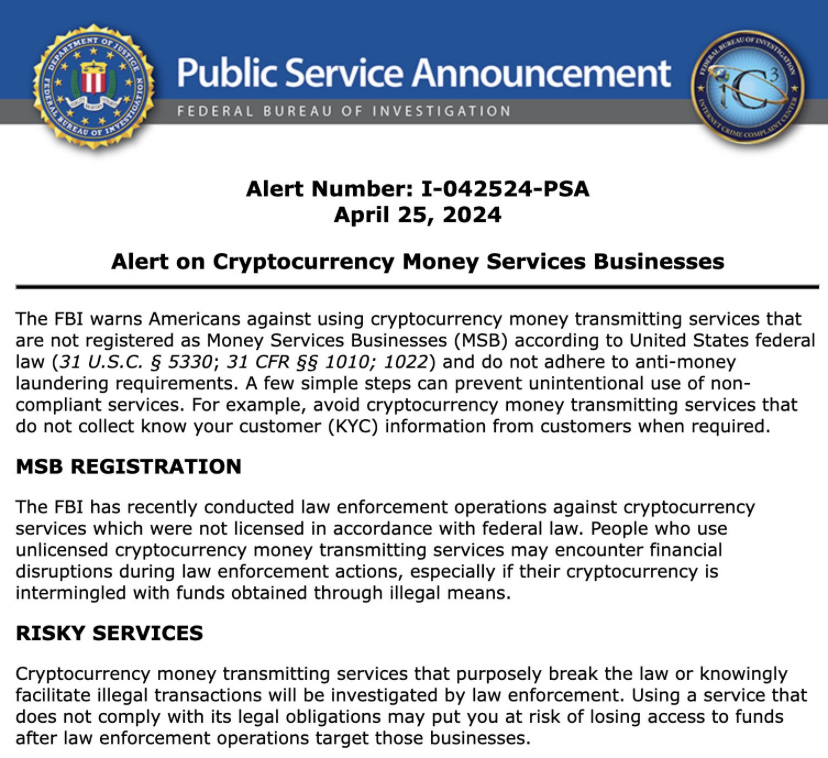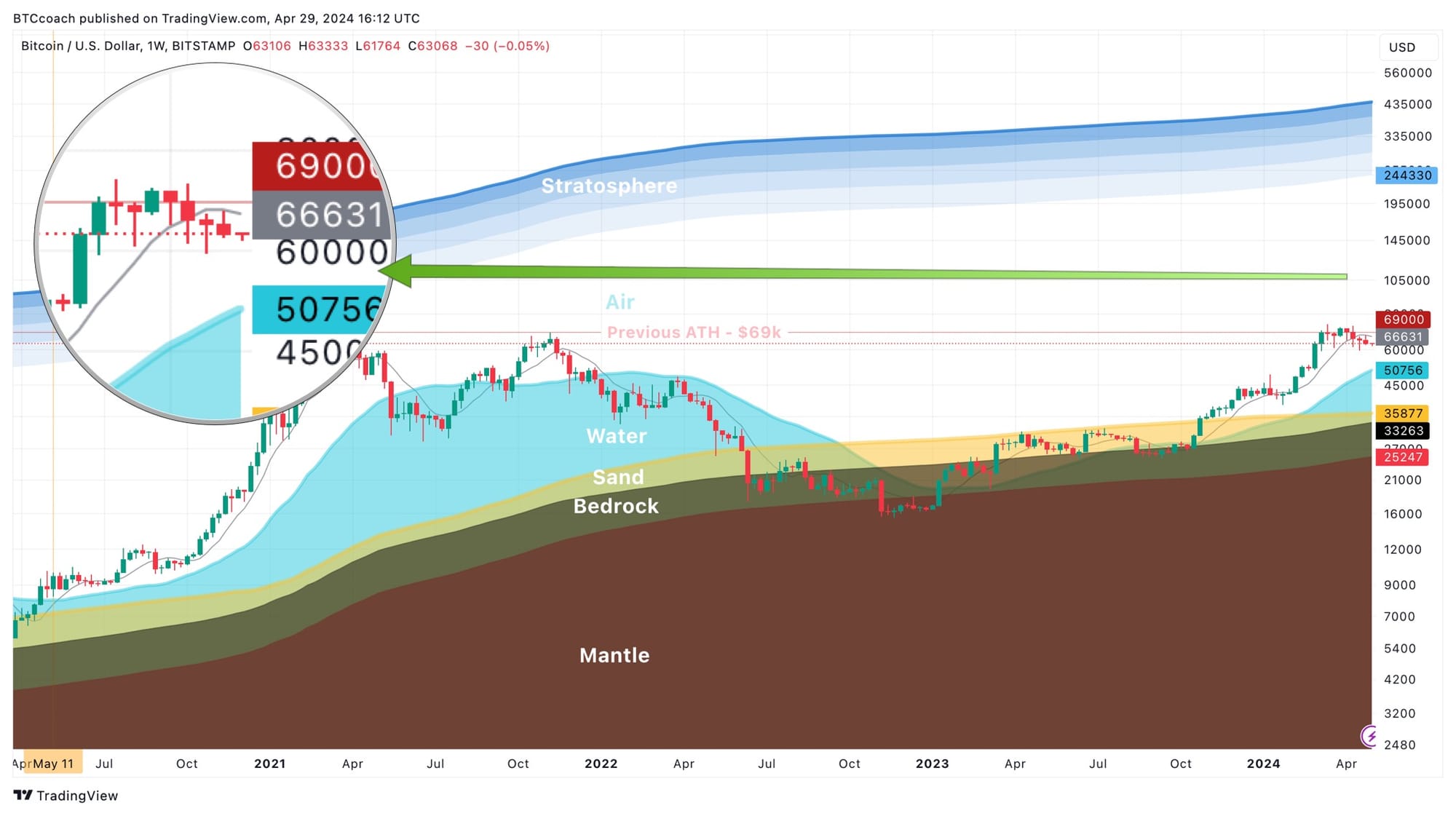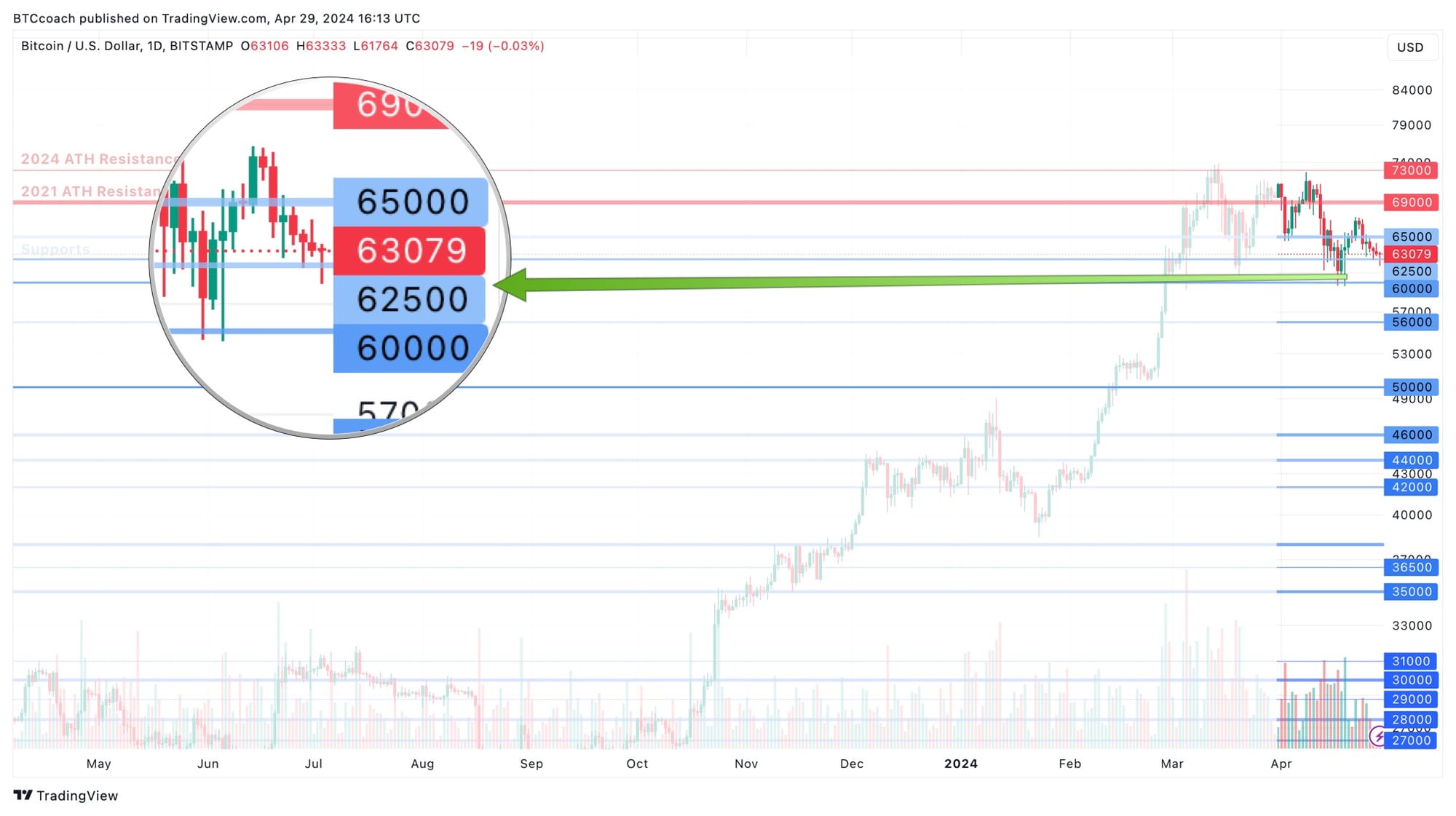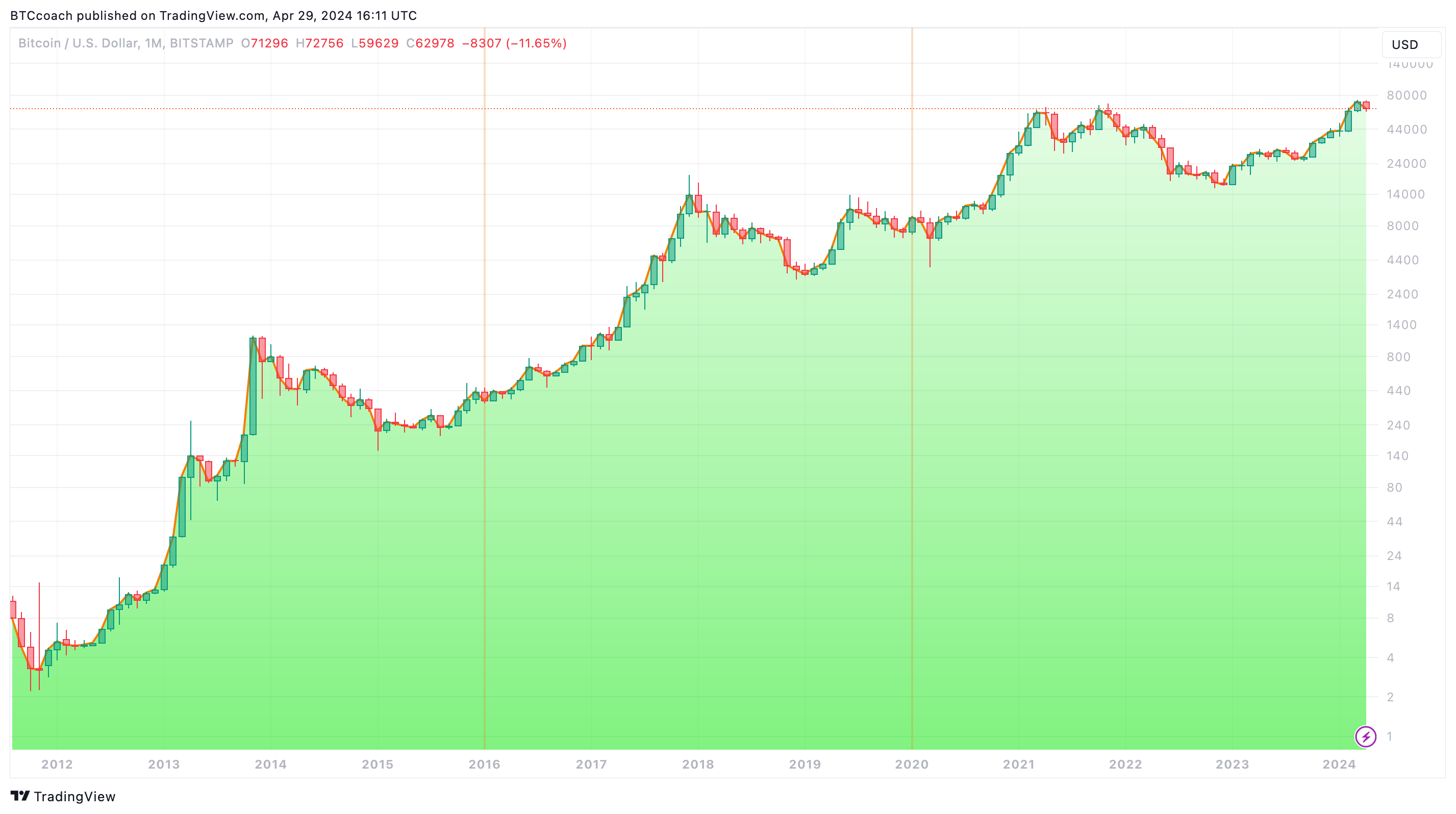2024.17 - Seppuku

IMHO
Last week the founders of Samourai —a popular, privacy focused wallet— were arrested and charged with money laundering.
Samourai allowed users to "mix" their coins using a technique they called "Whirlpool". There are different ways to "mix" but the basic premise is to make it harder to track identities tied to the ownership of certain coins.
As you may imagine, this created an uproar in the Bitcoin community
First Reading
At first blush, this triggered (appropriately) a "Bitcoin is under attack" reaction.
In retrospect, their playbook was obvious-
— Hodlorado ⛏️ (@hodlorado) April 25, 2024
Step 1. Approve ETFs to defang bitcoin
Step 2: KYC everybody
Step 3: Eliminate self-custody
Step 4: Tax the shit out of everybody
This is our fight for sovereignty.
STAY FROSTY & HODL ON!#bitcoin
The FBI even chimed-in with scary warnings about non-KYC (self-custodial) wallets:

This was scary enough to make popular (and personal favorite) Sparrow Wallet immediately remove its Whirlpool functionality from their wallet.
In light of recent developments, Sparrow v1.9.0 has been released which removes the Whirlpool client and other Soroban related features. All wallets and accounts are still accessible.
— Sparrow Wallet 🐦 (@SparrowWallet) April 25, 2024
Even Phoenix Wallet (one of the most popular Lightning wallets) opted out of serving US citizens entirely —even though theoretically Lightning is not the same as mixing, technically there is some resemblance.
On May 3rd, 2024, @PhoenixWallet will be removed from US app stores.
— Phoenix Wallet (@PhoenixWallet) April 26, 2024
Users from the US should empty their wallet:
- Settings > Close channels (Android)
- Settings > Drain wallet (iOS)
We highly recommend *not force-closing* channels, as on-chain fees could be significant.
Regardless of whether the attack on BTC perspective is objectively true, you should always act as if it is true. It informs the kinds of actions and safeguards you should put in place to prevent your BTC from being easily captured by a hostile government.
And let me be clear: they would absolutely, unequivocally prefer you NOT to take the necessary precautions and will make it uncomfortable for you if/when they can:
When we were audited, the IRS crypto committee told our accountant that cold storage was a "huge red flag"
— Brooke⚡️ (@bitcoinmom) April 25, 2024
It's the kind of things that are easy to do with a little planning and diligence and hard or impossible to do if you wait until its too late. A little paranoia pays good dividends with BTC.
Second Reading
Did Samourai even break the law?
Threse are the two main charges against the Samourai devs:
- Conspiracy to Commit Money Laundering.
- Conspiracy to Operate an Unlicensed Money Transmitting Business.
1- Whirlpool helps users coordinate mixing, it doesn't actually recieve, hold or even touch the funds. The prosecutors are trying to claim that the Samourai software/servers (not the users) were doing the money laundering.
To unpack this: Imagine you sell tools. Someone buys a hammer from you, uses it to attack the neighbors. You are charged for selling weapons. If this goes through it would set a chilling precedent, not just for Bitcoin. Can any developer be charged because a user of their software used their app to commit a crime? (scary news for Excel devs I guess)
2- They were not money transmitters. Again, because users had control of their funds at all times its easy to objectively state they didn't transmit money. This will come down to trying to prove they knew/encouraged use of their service for illicit activities.
Here is where the developers might have put a noose around their own necks. They had a public F*ck You attitude towards rules which will surely be used against them.
— Samourai Wallet (@SamouraiWallet) October 20, 2023
Travis Wert has an excellent post on Nostr if you want to dive deeper into the imfo above:

Ironically, for all the prosecution's bluster of the defendants knowing Samourai was a "haven for criminals" it turns out the type of mixing Whirlpool provides is not favored by money launderers.
A thread about this statement made in Samourai's indictment, from the perspective of a person who has extensively studied the design of zerolink implementations and who has also analyzed the on-chain activity of some crypto money launderers. pic.twitter.com/neOcWvjxyv
— LaurentMT (@LaurentMT) April 25, 2024
LaurentMT, who has domain expertise claims criminals prefer "fast" mixers where Whirlpool is designed to be "low-and-slow" providing more privacy over time.
The end result is that Whirlpool is actually one of the less useful mixers, if not the less useful, to crypto money launderers.
— LaurentMT (@LaurentMT) April 25, 2024
And this is somewhat confirmed by the alleged 5% of criminal funds that may have traversed Whirlpool.
A low figure compared to others mixers.
Third Reading
Stay guarded and chill. Whatever their intentions Team Samourai made themselves highly visible targets through their general public attitude and tweets.
Let us guard our sovereignty and our privacy, and let's be vigilant on any and all encroachments. But let's also be smart about it and maybe don't kick the dragon in the balls.
Keep calm and HODL #Bitcoin.
— Samson Mow (@Excellion) April 27, 2024
Everyone seems to be overreacting to the Samourai arrests, the FBI PSA, and Phoenix leaving the US. Here's my attempt to break it down.
Samourai
You have to unpack all of the different elements. Could this be a state attack on self-custody and… pic.twitter.com/gzjo9b9IVg
PS. If you were a Samourai user
You might want to read this (your should be fine)
If you were using @SamouraiWallet with your own Dojo backend, you should still have reasonable privacy on historic mixes.
— Seth For Privacy | Activate LNHANCE (@sethforprivacy) April 24, 2024
If using default Samourai backend, you should assume xpubs were compromised and your past/future privacy is at risk. Would recommend migrating to a new seed. https://t.co/4kluCcE1Qr
Closing Thoughts
I want to reiterate you should be performing full self-custody at this point. If you think "you're Bitcoining" by holding an ETF you should book a call with me right now.
Attacks to self-custody will come —there are way too many incentives for it— and an ETF gives you no defense against them.
One incentive could be exercising Capital Controls ("your money stays HERE")
They're going to go after self-custody because they need capital controls to properly execute financial repression.
— Dylan LeClair 🟠 (@DylanLeClair_) April 25, 2024
Capital is sufficiently captured in walled-garden ETFs.
Widely adopted self custodial #bitcoin used as a MoE w/ privacy tools present an existential threat. pic.twitter.com/OLefHBKnHH
Why would they do this? Listen to Ray Dalio's description of a collapsing currency and let me know if anything comes to mind…
Ray Dalio: How to know when a currency is on its way to collapsing 👀
— Bitcoin News (@BitcoinNewsCom) April 25, 2024
pic.twitter.com/VePSAuCtim
Another possible motivation —one that requires deeper connecting-of-the-dots— is Wall Street trying to co-opt BTC to use as the base-layer of their tokenized "omnicoin"
If your Bitcoin heroes are telling you to submit to the State,comply harder, everything will be fine bc you might get rich if you let criminal bankers mold Bitcoin into their plaything, find new heroes. Complying with tyranny for the promise of wealth makes you a banker stooge
— Whitney Webb (@_whitneywebb) April 24, 2024
I know self-custody can be intimidating, especially as the value of your holdings rise. I was very excited to see Nunchuk announce their new "Hal Finney" wallet. I've been experimenting quite a bit with Nunchuk recently and signed up to try the "Hal Finney", I'll report more on this soon.
Introducing Finney: The Bitcoin Wallet For Families
— nunchuk_io (@nunchuk_io) April 24, 2024
We are thrilled to unveil Finney—a revolutionary Bitcoin wallet designed for families seeking security and financial autonomy. Say goodbye to third-party dependencies!
Why Finney?
Unlike traditional solutions like Unchained,… pic.twitter.com/CSAoe9uHxk
Speaking of Seppuku
I couldn't NOT mention the Yen, which may be big news next week. More in the Fiat Section but here's a taste:
“The Bank of Japan is caught in a black hole of their own design.”
— Onramp (@OnrampBitcoin) April 27, 2024
MUST WATCH MONOLOGUE: @peruvian_bull breaks down the economic quagmire in Japan & continued devaluation of the yen.
Catch the full conversation on The Last Trade… pic.twitter.com/nE38AT33kA

Bitcoin News
All the Action
This breakdown of MSTR stock by Michael Saylor is simply phenomenal, if you have money in a brokerage account and haven't allocated to MSTR, you may want to give this a listen.
This is a masterclass 🤯
— BLAKE⚡️ROGUE MONEY USER (@bleighky) April 25, 2024
First time hearing Michael Saylor dive deep on the advantages of $MSTR over #Bitcoin ETFs @saylor pic.twitter.com/mhB1OpXvxK
Speaking of MSTR, it's hard to know just how much adopting the stock price could benefit from adopting the new accounting rules recently approved by FASB. Ryan, here is so bullish he thinks it could go 6X
$MSTR Theoretical post-FASB Impact
— Ryan McGinnis (@ryQuant) April 22, 2024
The FASB literature indicates that fair value measurements in digital assets will be reflected in Net Income. So, there is reason to believe that the unrealized #BTC gains will flow to EPS, which could *potentially* re-price MSTR to 10k⚡️ pic.twitter.com/lXSu7f0GzJ
What is not in question is that the numbers would benefit enormously, as the current accounting standards for corporations holding BTC are very punitive, as Jeff demonstrates in this tweet.
Impact of FASB digital asset accounting on the financial world & relative performance of $MSTR Historical EPS over the last 14 years: A 🧵
— Jeff (@PunterJeff) April 24, 2024
Prior to $MSTR adopting the Bitcoin as treasury asset, $MSTR had 40 positive EPS quarters out of the last 46 (representing 87% positive… https://t.co/AQdjfv2iov pic.twitter.com/gy5SaAmbnZ
Long story short, as soon as MSTR switches to the new accounting rules, its numbers are going to look A LOT better. Most might not understand the nuance of what happened, but the message of "BTC is good for your balance sheet" should be loud and clear.
And slowly but surely, the tools for businesses to add BTC will keep rolling out.
square sellers: auto-convert a percent of your daily sales to bitcoin: https://t.co/sMiTIZV916 pic.twitter.com/Glnt8gc2eC
— jack (@jack) April 24, 2024
Mellons
The oldest bank in the US, BNY Mellon has dipped its toes into BTC through various ETFs.
BNY Mellon is the largest custodian of wealth on plant Earth. If you think Black Rock having $10 trillion under management is big, try BNY Mellon's $49 trillion. 🤯 #stackharder https://t.co/1W2Upj8XG8
— Oliver L. Velez ⚡️ 13%'er Bitcoiner (@olvelez007) April 25, 2024
It turns out at least one of the Mellon heirs has been a Bitcoiner for some time.
"I feel like citizens are fed up with banksters…We need to live in a more transparent, free democracy. The more secretive America becomes, the more dangerous it is. The solution, is Bitcoin"
—Matthew Taylor Mellon, from 2014 Forbes Article
Registered Financial Advisors (RIAs) are also testing the waters.
Caught up with a Bitwise relationship manager, who told me that in the last few days, 3 RIAs managing $100M-$2B in AUM each, across 100s of families, decided:
— Hunter Horsley (@HHorsley) April 24, 2024
1. 2% allocation to Bitcoin proposed to all clients
2. 3-10% allocation made by discretion to all
2. 2.5% allocation to…
Launch
The HongKong ETF is expected to launch tomorrow. The market is a different beast from the US in several ways. However it plays out in the short run, this should be bullish for price.
HK spot bitcoin/ether ETFs officially approved to begin trading on April 30th. Fees are 30bps, 60bps and 99bps which is on avg lower than we thought, good sign. We doing an Analyst Q&A in an hour on this w/ local HK team. Register here, bring your qs: https://t.co/GzzCZailx3 https://t.co/AvJ6dv2Xha
— Eric Balchunas (@EricBalchunas) April 24, 2024

Krypto News
"Crypto" can be lethal to your portfolio
Chaudenfreude
On the one hand it's good to see companies standing up to the SEC, on the other hand I really don't feel Consensys —the poster child for decentralization theater— can or should be defended.
Today, we sued the #SEC.
— Bill Hughes : wchughes.eth 🦊 (@BillHughesDC) April 25, 2024
They have no right to unplug the U.S. from #Ethereum.
They have no right to prohibit peer-to-peer blockchain software.
Too many Americans - developers, investors, and everyday users - are going to be hurt if they are allowed to continue unopposed.… https://t.co/RxInVS9ZCg

Fiat News
Wakarimasen
Much ink has been spilled about the Bank of Japan and I can't promise a great bite sized-summary, so I'll borrow one from Luke Gromen:
Everybody seems to remember that Reagan won the Cold War by bankrupting the Soviets; nobody seems to notice that is EXACTLY what the Russians and Chinese are doing to us now…and the weaker JPY is serving as an accelerant on this. —Luke Gromen
Context:
Japan has been at the forefront of Monetary shennanigans —the kings of runaway debt— for decades. That their economy has not melted down completely is a testament to their skill, aided by an unusual combination of demographics, trade imbalance and cultural cohesion.
Lately the Yen has been under a lot of pressure, made visible by the Yen's weakening exchange rate
Japan is the canary. https://t.co/PfxdGfDSWY pic.twitter.com/ElDvWKQBGy
— Lawrence Lepard, "fix the money, fix the world" (@LawrenceLepard) April 27, 2024
They have a very deep (multi-trillion) war chest of US-denominated assets (including USTs) which they could sell to help stop the Yen's downward spiral
If Japan wants to slow its FX devaluation, they could raise rates. However, that would greatly increase their deficit, which the BOJ would have to monetize, and thus accelerate money supply growth.
— Lyn Alden (@LynAldenContact) April 26, 2024
Or they could sell U.S. Treasuries, of which they are the largest foreign holder. pic.twitter.com/smHRNIRnuM
But geopolitics come into play in ways that are above my paygrade. Two notable items are :
- Treasuries are not as popular as they used to be. If Japan dumps their US Treasuries this would further disrupt the US Gov's ability to fund itself through new debt (which would quickly put them in Uncle Sam's shit-list).
When I see this chart, I see that Hitler movie meme in my head, with Hitler saying "As long as Central Banks keep growing UST holdings, the US fiscal situation will be fine", followed by his general nervously saying, "Uh, sir...global CB's stopped growing UST holdings in 2014." pic.twitter.com/GnHVdnbIEU
— Luke Gromen (@LukeGromen) April 25, 2024
- The Yen, the Yuan, the price of oil and the USD are intertwined in a complex relationship that has changed since China started pricing oil in gold-backed Yuan
What is happening in China?
— The Kobeissi Letter (@KobeissiLetter) April 24, 2024
Gold trading volume in China is now 400% LARGER than the average seen in 2023.
The trading activity in gold on the Shanghai Futures Exchange spiked to 1.3 MILLION lots on the peak day of trading last week.
This came at the same time that gold prices… pic.twitter.com/IFoFxFOlPw
This morning the BOJ finally intervened to slow down the crash.
Normal price action for the world's third largest currency. 🇯🇵
— Dylan LeClair 🟠 (@DylanLeClair_) April 29, 2024
Looks like the Bank of Japan decided to use its $1T treasure chest to (temporarily) stem the route. $JPY $USD pic.twitter.com/CNrE8e92Lx
We will see what comes of it, and how long it lasts.
Your takeway is: The Yen breaking is like the fiat system running a high fever, something's wrong and short term remedies are unlikely to mean a long-term cure.
PS. This is how much BTC you need to buy 1 Yen = 0.00000009 (or 9 sats). In my book when your unit of currency is worth less than 1 sat, that's game over.
Symptoms
Speaking of fevers, the US planning on 1.7 Trillion in interest spending a year from now is another clear sign all is not well in fiat-world.
Any great power that spends more on debt service (interest payments on the national debt) than on defense will not stay great for very long —Ferguson's Law
MAXIMALISM WILL RISE
— Balaji (@balajis) April 24, 2024
Inflation is a real problem for the regime. It cuts across demographics to cut into their support.
And there's really nothing they can do.
Yeah, they can hike rates, but that just means high prices for young people on another dimension — namely, on their… https://t.co/IuYdCME9SK pic.twitter.com/ZB8muYyNs0
The "Hail-Mary" tax increases being considered wouldn't put a dent on that debt, even if they didn't backfire (which I bet they would)
Biden is calling for a 44.6% capital gains rate. Please vote this old loser and his evil cabal of wormtongues out of power. pic.twitter.com/oJE07JgCvF
— Autism Capital 🧩 (@AutismCapital) April 24, 2024
For some, the ravages of inflation have been masked by a nominally-rising stock market (which has been flat on real terms)
FINANCIAL GRAVITY:
— Peruvian Bull (@peruvian_bull) April 23, 2024
If we divide the performance of the S&P 500 by the Fed’s Balance Sheet since the GFC, the LINE IS FLAT.
This means that there has been basically NO REAL growth in stock prices since 2008- with the only rise in prices due to money printing.
The correlation… pic.twitter.com/7dOPeIqBBR
With the Magnificent 7 been doing most of the heavy lifting, it's easy to overlook that most of the stock market is actually not doing all that well. In fact, considering inflation, nothing is.
There isn’t a single asset class that is currently above its inflation adjusted highs from 2021.
— Michael A. Gayed, CFA (@leadlagreport) April 25, 2024
Let that sink in.
In a nutshell, this is how fiat is doing:
Big Mac went from $0.50 to $8 and lost 40% of its size from 1980-2024.#Bitcoin fixes this. pic.twitter.com/44wpXzxu9n
— Vivek⚡️ (@Vivek4real_) April 22, 2024
Tit-forTat
The seizure of frozen assets, property of the Russian Central Bank, prompted a swift response from Russia, which said it would seize just under $440M from Epstein's banker (JP Morgan) and seizures could grow substantiually larger.
BREAKING: Russia warns U.S. that it is prepared to seize $288 billion in U.S. assets if Biden seizes Russian state assets.
— Financelot (@FinanceLancelot) April 26, 2024
The foreign aid bill signed by Biden on Wednesday had a hidden clause allowing him to seize all Russia assets & give them to Ukraine🤦♂️ https://t.co/HOo2YTs4Qg pic.twitter.com/2LNDMF9JLS
Breaking the tacit agreements on what is lawful is a stupid and very dangerous game to play.
This is a bigger deal than people think.
— Akshay BD (@akshaybd) April 26, 2024
Rule of law accounts for the single biggest source of wealth. Rule of law is the idea that everyone (including the govt.) is accountable to laws that are "publicly enacted, equally enforced, and independently adjudicated."
Seizure of… https://t.co/evto92CMR5 pic.twitter.com/s4fJ7qykcH
This is not the product of ignorance, so what is it?
27 years ago, Zbig Brzezinski warned "the most dangerous scenario would be a grand coalition of China, Russia, & perhaps Iran."
— Luke Gromen (@LukeGromen) April 22, 2024
Out of hubris, US policymakers spent the last 20-25 years pursuing policies that [wait for it]... pushed China, Russia, & Iran closer together.
1/ pic.twitter.com/JfhRDYRJty

Dystopian News
Refusing Money
A country that does not have excessive wealth is turning off excessive hydro generation instead of using mining to balance their load and earn additional revenue. This is how early we are.
Completely insane
— Alex Gladstein 🌋 ⚡ (@gladstein) April 24, 2024
This would never happen in a world where policymakers understood that we have a modular profitable technology for transforming waste energy into capital
Paging @GridlessCompute https://t.co/SE3SuPkqFg
Tempting
A flamethrowing robo-dog you say? When BTC hits $200k, there will be signs…
🔊 … “Now I am become Death, destroyer of worlds”
— Wall Street Silver (@WallStreetSilv) April 24, 2024
Throwflame unveils robot dog Thermonator with flamethrower attached.
The Ohio-based firm has announced the $9,420 bot is available for purchase by the general public and government agencies for the first time.
🚨🚨🚨 pic.twitter.com/Sis537qgPg
Pause
It is sobering that there are people who believe this gentleman has four more years in the tank.
You best start believing in humiliation rituals, you’re living through the biggest one in human history. pic.twitter.com/fZ0MfK7jGa
— Marty Bent (@MartyBent) April 24, 2024
Bug Detector
Are you already eating the bugs? You may think you aren't, but do you actually know?
🚨‼️🇩🇪 The WEF has begun experimenting on German citizens by including ‘insect derivative ingredients’ in supermarket foods.🪳
— Orthodox Canonist (@OCanonist) April 28, 2024
The German people were smart enough to develop apps which allow for scanning products, identifying them. “We will not eat the bugs” has become reality. pic.twitter.com/VzrY4RrAwg
Fine Print
You do read these, right? Did you know some GameStation in the UK allegedly included language where you transferred ownership of your soul to them in one of these as part of an April 1st joke in 2010? Fun times.
Visualizing the Length of the Fine Print, for 14 Popular Apps 📜
— Visual Capitalist (@VisualCap) April 26, 2024
See the full infographic from the archive: https://t.co/xya5VtCmqk pic.twitter.com/UNHrN0ne2K

Price News
Guest Charts
Not a chart, but a useful reminder. Markets like BTC often "reset" after a bullish run (like we've had since September 2023). These breathers are necessary and healthy.
One of the healthiest market resets I have seen in a long time.
— _Checkmate 🟠🔑⚡☢️🛢️ (@_Checkmatey_) April 24, 2024
It's similar across onchain metrics too, #Bitcoin looks remarkably solid tbh. https://t.co/lDx5jmxc79
Bitcoin Surfing
The Board ($66.6k) is still close but BTC didn't even reach for it last week.

Dip Fishing
Last week I suggested placing your nets around $62.5k I hope you caught some sats! If I were fishing for even cheaper sats I'd place a net close to $60k

Calm Chart
April is holding red and I expect it will close that way.






